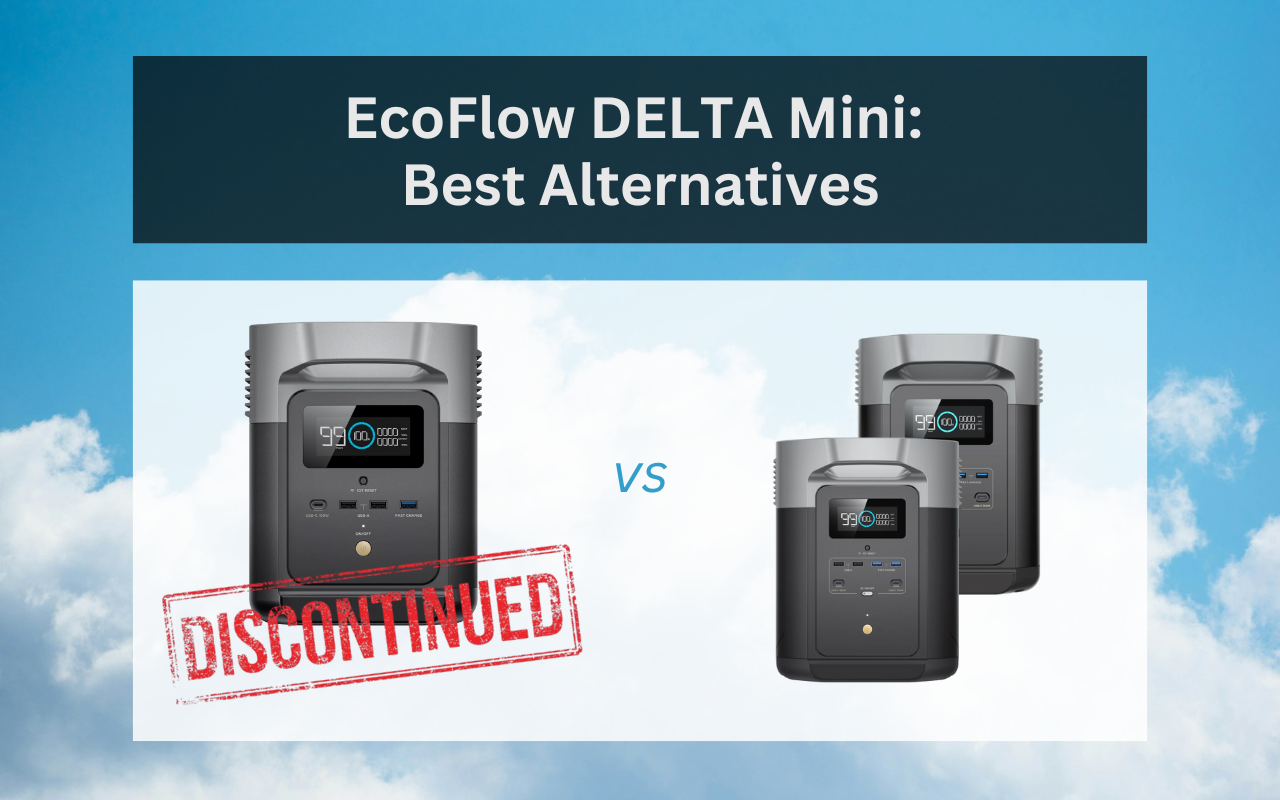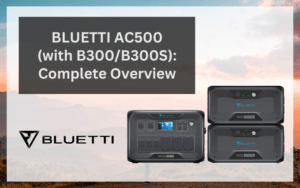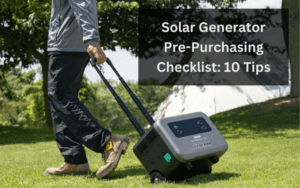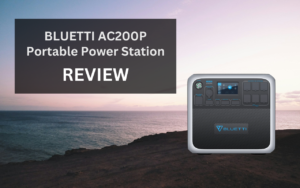The EcoFlow DELTA Mini has now been discontinued by EcoFlow, meaning it is no longer available for purchase on the EcoFlow website. This is likely part of EcoFlow’s ongoing efforts to improve their products, focusing on newer and better options. So, what’s the best alternative to the DELTA Mini?
In this article, we present two top options from EcoFlow’s portable power station range: EcoFlow’s DELTA 2 and DELTA Max. (Note that two variations of the DELTA Max are available to purchase – 1600 and 2000 – but we will be referring to the 1600 option as it is a closer alternative to the DELTA Mini than the higher-budget 2000.) We will provide a thorough comparison of these models to the original DELTA Mini across a number of categories, ensuring you find the best portable power solution for your needs.
In addition to their solar panel and smart devices range, EcoFlow’s product line-up is categorised into two main series: the DELTA Series and the RIVER Series. The DELTA series is designed for those requiring robust power solutions, featuring models with higher capacities and outputs. On the other hand, the RIVER series caters to users looking for more affordable options with moderate power needs.
EcoFlow’s DELTA range consists of the DELTA, DELTA Mini (now discontinued), DELTA Max, DELTA Pro, DELTA 2, DELTA 2 Max, DELTA Pro Ultra, and DELTA Pro 3 (where ‘Pro’ trumps ‘Max’). Click here to see the full range of DELTA products.
Their RIVER series consists of the RIVER Pro, RIVER 2, RIVER 2 Pro, and RIVER 2 Max. Click here to see the full range of RIVER products.
We always recommend purchasing EcoFlow products directly from their official websites or Amazon stores. While there are many reputable wholesalers and third-party sellers, buying from these sources may invalidate your warranty and make it more challenging to contact customer support. For this reason, any and all links in this article will take you straight to the brands’ websites or official Amazon stores.
For more information on each brand’s warranty policies, visit EcoFlow’s Warranty Policy webpage.
EcoFlow DELTA Mini

(Not currently available on Amazon)
Price (UK): £999
Price (US): $999
Power (W): 1400
Surge (W): 2100
Capacity (Wh): 882
Cell chemistry: NCM Li-ion
Weight: 23.6 lb (10.7 kg)
Dimensions: 14.9 × 7.2 × 9.4 in (37.8 ×18.4 × 24 cm)
Life span: 800 cycles to 80% capacity
Warranty: 24 months
The DELTA Mini has been discontinued.
EcoFlow DELTA 2

Price (UK): £899
Price (US): $649 ($999 full price)
Power (W): 1800
Surge (W): 2700
Capacity (Wh): 1024
Cell chemistry: LiFePO4
Weight: 27 lb (12 kg)
Dimensions: 15.7 x 8.3 x 11 in (40 x 21.1 x 28.1 cm)
Life span: 3000 cycles to 80+% capacity
Warranty: 5 years
Expandable capacity up to 3,000Wh with the addition of the ‘DELTA 2’, ‘DELTA 2 Max’, or ‘DELTA Max’ Smart Extra Batteries.
EcoFlow DELTA Max
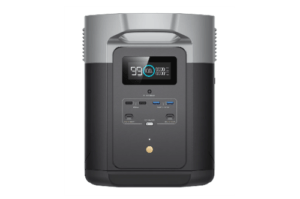
Price (UK): £899 (£1,249 full price)
Price (US): $1,199 ($1,799 full price)
Power (W): 2000
Surge (W): 5000
Capacity (Wh): 1612
Cell chemistry: NCM Li-ion
Weight: 48 lb (22 kg)
Dimensions: 19.6 x 9.5 x 12 in (49.7 x 24.2 x 30.5 cm)
Life span: 500 cycles to 80% capacity
Warranty: 24 months
Specs refer to the 1600 model – 2000 is also available on the DELTA Max product page.
Expandable capacity up to 6,000Wh with the ‘DELTA Max’ Smart Extra Battery.
Price

The EcoFlow DELTA Mini was priced at $999 (and was most recently available at a discounted price of $549). The DELTA 2 is listed at $999 (but is on sale for $649 at the time of writing). The most expensive of the three is the DELTA Max (1600), priced at $1,799 (but currently on sale for $1,199).
Output (W)

The EcoFlow DELTA Mini has the lowest output of the three, at 1400W, allowing it to power up to 12 devices simultaneously, and a surge capability of 2100W. The DELTA 2 has a higher regular output of 1800W, supporting up to 13 devices at once, and offers a surge output of 2700W. It also features X-Boost Technology, enabling it to handle devices requiring up to 2400W without overloading.
The DELTA Max (1600) surpasses both, with 2000W output and a surge capability of 5000W, supporting nearly all home appliances and high-wattage devices. The DELTA Max (1600) also features X-Boost Technology, which allows it to handle high-wattage devices up to 3400W without overloading.
Capacity (Wh)
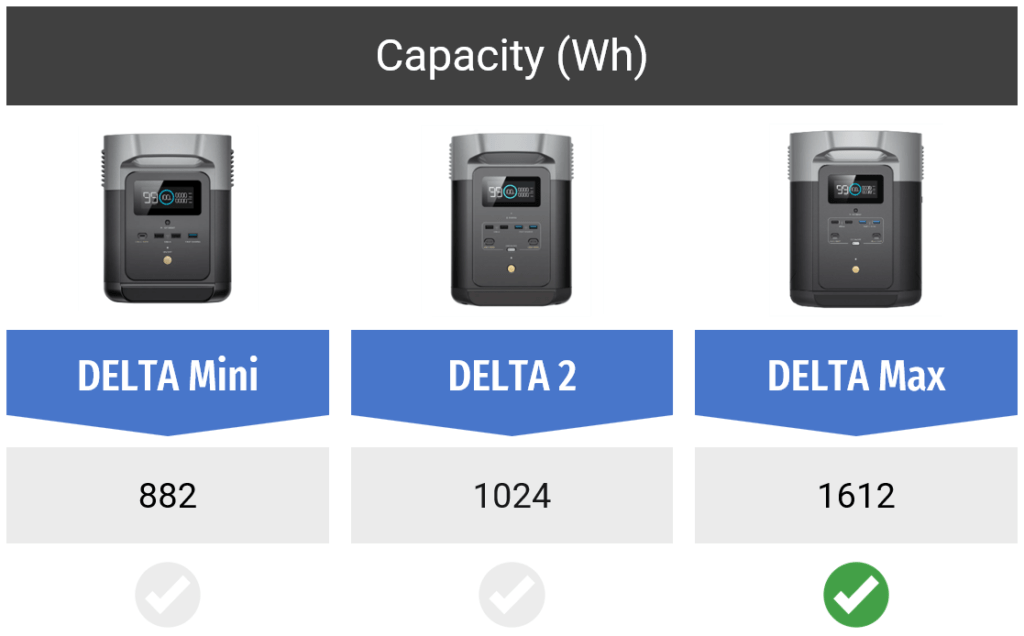
The EcoFlow DELTA Mini has a capacity of 882Wh, which is sufficient for powering smaller-scale essential devices during short-term power outages or outdoor activities. The DELTA 2 has a higher initial capacity at 1024Wh, with expandability up to 3,000Wh with the addition of the ‘DELTA 2’, ‘DELTA 2 Max’, or ‘DELTA Max’ Smart Extra Batteries. The DELTA Max (1600) has the highest capacity of the three, at 1612Wh, expandable up to 6kWh with the DELTA Max Smart Extra Battery.
Battery type

The EcoFlow DELTA Mini uses NCM (Lithium Nickel Cobalt Manganese) battery chemistry, known for its lightweight and cost-effectiveness. However, NCM batteries have a shorter lifespan and can be more prone to overheating compared to other types.
In contrast, the DELTA 2 uses a LiFePO4 (Lithium Iron Phosphate) battery, which has significant advantages in safety, durability, and efficiency. LiFePO4 batteries have the safest profile among lithium battery types, with a much lower risk of overheating or catching fire, even under stressful conditions. They also have a cycle life that is around 4-5 times longer than that of NCM Lithium-ion batteries, making them more economical in the long run despite their higher initial cost and weight.
The DELTA Max (1600) uses NCM Lithium-ion batteries like the DELTA Mini. While these batteries keep the unit relatively lighter and more affordable upfront, they do not match the extended lifespan and enhanced safety features of the LiFePO4 batteries used in the DELTA 2.
Charge life cycle
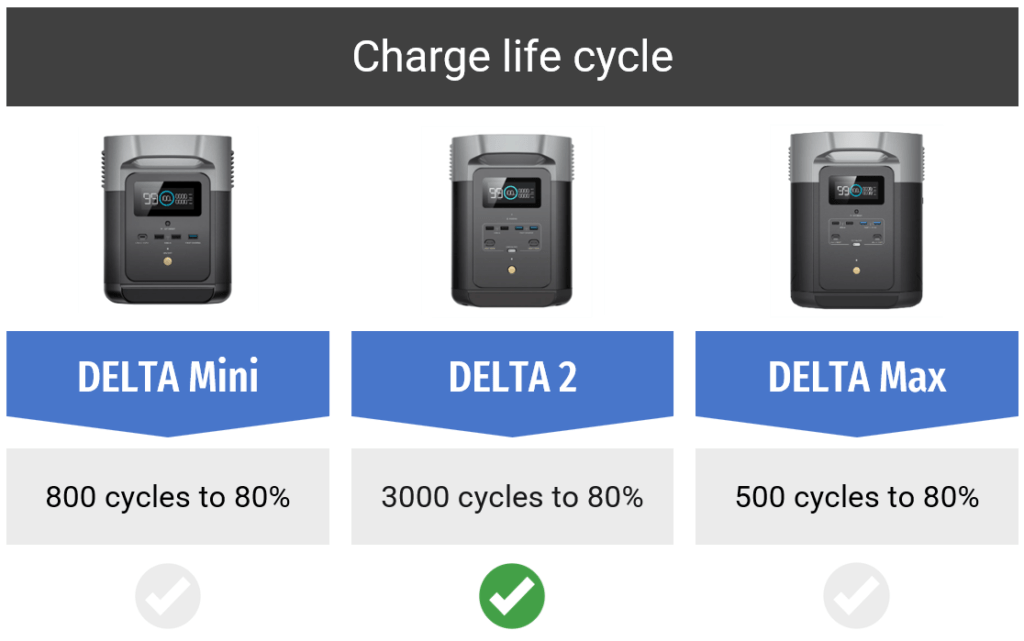
The EcoFlow DELTA Mini has a charge life cycle of 800 cycles before its capacity drops to 80% – a typical life cycle associated with its NCM Lithium-ion battery chemistry. In comparison, the DELTA 2, with its LiFePO4 battery, lasts 3000 life cycles before reaching 80% capacity. Like the DELTA Mini, the DELTA Max (1600) also uses NCM Lithium-ion technology, but only has a charge life cycle of 500 cycles to 80% capacity. (Note that the DELTA Max (2000) has a cycle life of 800 cycles to 80% capacity, making it longer lasting than its 1600 counterpart.)
Therefore, of the three, the DELTA 2 stands out as the option for long-term use, thanks to its significantly longer battery life and superior durability.
Rate and depth of discharge
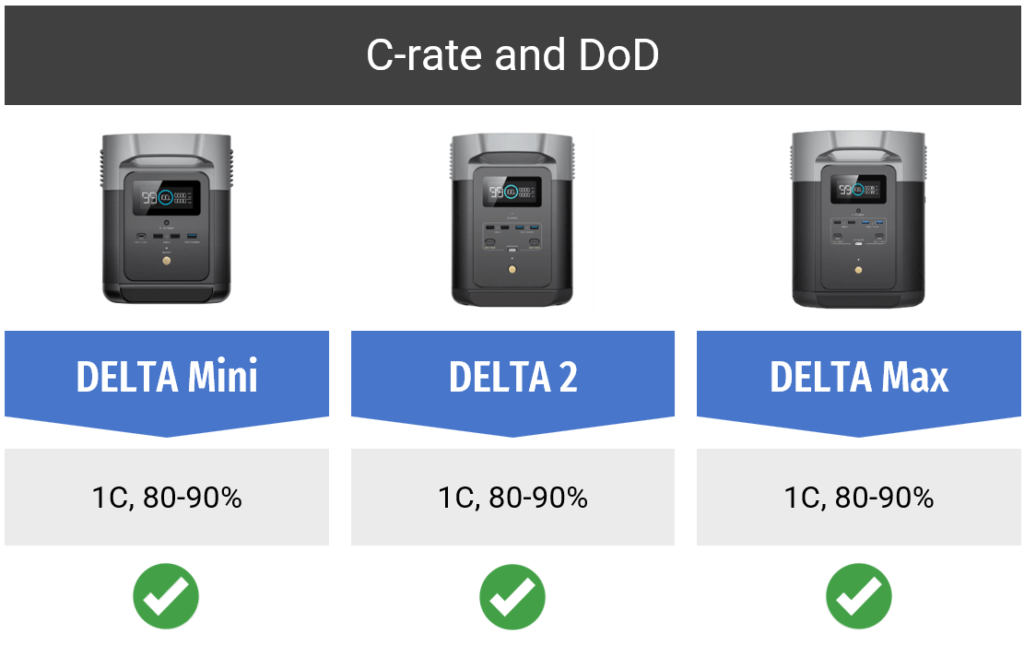
The rate of discharge, or C rating, measures how quickly a battery can be discharged relative to its maximum capacity. A 1C rating means the battery can be discharged in one hour, delivering its full capacity. For example, a 1Ah battery at 1C provides 1A for one hour. At 0.5C, the same battery would provide 0.5A for two hours, and at 2C, it would deliver 2A for 30 minutes. Higher C rates can lead to reduced efficiency and faster depletion due to increased losses during rapid discharges.
For more reading on C-rates, we recommend this helpful resource from batteryuniversity.com.
Depth of Discharge (DoD) refers to the percentage of a battery’s capacity that has been used. A higher DoD indicates a greater amount of energy has been drawn from the battery. For instance, a battery with a DoD of 80% has used 80% of its capacity.
Even though the DELTA Mini and DELTA Max use NCM batteries, and the DELTA 2 uses LiFePO4 batteries, both are types of lithium batteries, therefore they share very similar C rating and DoD – which makes life a little easier when it comes to comparing the models on this aspect.
The EcoFlow DELTA Mini’s NCM battery has a discharge rate of 1C and a depth of discharge (DoD) of 80-90%. This makes it suitable for moderate power needs, ensuring good battery health over its lifespan. The DELTA 2 uses a LiFePO4 battery, which supports a higher discharge rate and is known for its long cycle life, often reaching between 3000 to 6000 cycles. Like NCM batteries, the typical LiFePO4 battery has a C-rate of 1C. While LiFePO4 batteries can technically be discharged to 100% DoD, it is generally recommended to discharge them to only 80-90% to maintain optimal battery health and longevity. The DELTA Max (1600) also uses an NCM battery, meaning it shares the same 1C discharge rate and 80-90% depth of discharge as the DELTA Mini.
So, in terms of discharge rate and DoD, all three models’ batteries have very similar specs – 1C discharge rate and an 80-90% DoD. In any case, it’s not recommended to exceed a depth of discharge of 80% in order to preserve the battery’s health.
Recharging options and speed
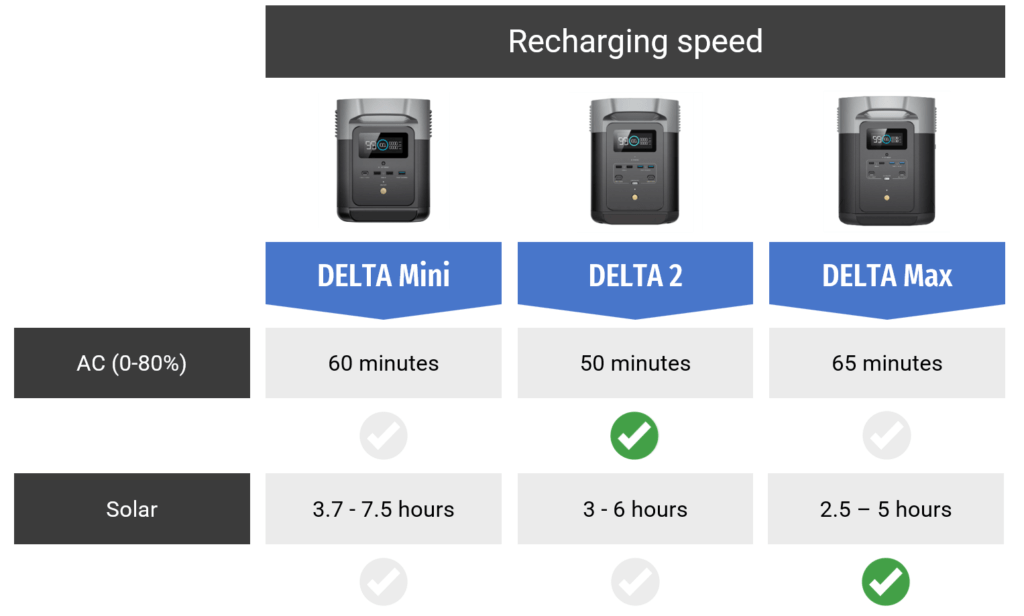
The DELTA Mini can recharge from 0%-80% in just under an hour via AC, achieving a full recharge in 1.6 hours. It also offers flexible solar recharging options, taking between 3.7 to 7.5 hours depending on the panel configuration, and supports car charging which takes around 9.5 hours.
The DELTA 2 improves on this charging speed – it can recharge from 0-80% in just 50 minutes, achieving a full recharge via AC in 80 minutes. It supports a broader range of solar charging inputs, allowing for full recharge times as quick as 3-6 hours with optimal solar panel setup, and offers car charging options similar to the DELTA Mini.
Recharging the DELTA Max (1600) is a little slower than the DELTA Mini and DELTA 2, but just barely – it can recharge from 0-80% in 65 minutes via AC, and takes 1.6 hours (~90 minutes) to recharge fully. It also supports solar recharging, capable of achieving a full charge in 2.5 to 5 hours depending on the panel configuration. Additionally, the DELTA Max (1600) can combine AC with solar or the EcoFlow Smart Generator to further enhance recharging speed, making it a versatile option for various recharging scenarios. This ability to combine with the EcoFlow Smart Generator is a feature specific to the DELTA Max (1600) – the DELTA Mini and DELTA 2 do not have this option.
Portability and durability

Weight
Weighing 23.6 lbs (10.7 kg), the DELTA Mini is the lightest among the three models, making it the most portable option for on-the-go use. The DELTA 2 weighs 27 lbs (12 kg), making it slightly heavier but still manageable for transport. The DELTA Max (1600) is significantly heavier at approximately 48 lbs (22 kg), due to its larger capacity and expanded features, making it less portable but ideal for more stationary use.
Size
In terms of dimensions, the DELTA Mini measures 14.9 x 7.2 x 9.4 in (37.8 x 18.4 x 24 cm), making it the most compact option. The DELTA 2 is slightly larger at 15.7 x 8.3 x 11 in (40 x 21.1 x 28.1 cm), and the DELTA Max (1600) is the largest at 19.6 x 9.5 x 12 in (49.7 x 24.2 x 30.5 cm). Despite the size differences, all three models are designed for ease of transport (they are each “portable power stations”, after all), though the DELTA Mini and DELTA 2 are more suited for frequent mobility.
Water-resistance
Unfortunately, none of the models are water-resistant or waterproof, and therefore must be kept away from liquids. The good news is that water-resistant cases are available to purchase for all of the DELTA Mini, DELTA 2, and DELTA Max (links open in new tabs).
Warranty
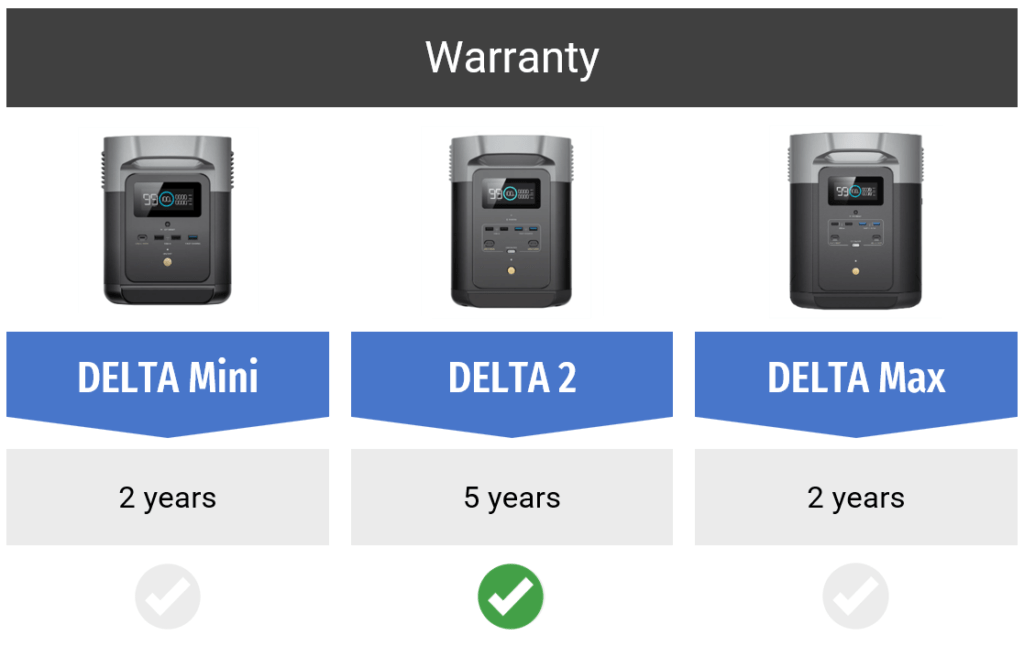
Both the DELTA Mini and DELTA Max (1600) come with a 2-year warranty, whilst the DELTA 2 has an extended 5-year warranty.
It’s important to note that these warranty terms apply to products purchased directly from the EcoFlow website. They say on their website that warranty periods may also vary according to local laws and regulations, so it’s always recommended to review the specific terms applicable in your region.
As mentioned at the start of this article, it is always recommended to purchase EcoFlow products directly from their official online store, as purchasing from third-party sites such as Amazon or wholesalers may affect the product’s warranty.
Customer feedback
When it comes to customer reviews, all three products have customer reviews averaging 4.9/5. We aggregated the most common or significant customer feedback for you to review below.
DELTA Mini: ⭐⭐⭐⭐⭐ (120)
- ✅ Portability and power: Customers appreciate the compact size and lightweight design of the DELTA Mini, which makes it ideal for both home use and on-the-go activities such as camping and road trips. Despite its small size, it provides substantial power to run essential devices.
- ✅ Fast charging: The fast charging capability is highly praised. Users noted that the DELTA Mini charges up quickly, allowing for continuous use with minimal downtime.
- ✅ Versatility: Many reviewers highlighted the DELTA Mini’s ability to power a wide range of devices, from small electronics to larger appliances like refrigerators and power tools, making it a versatile backup power source.
- ✅ Build quality: The robust and rugged design was a standout feature, with users noting that it holds up well under various conditions, including bumpy transport to remote locations.
- ❌ Cold weather performance: Some users reported that the DELTA Mini struggles to recharge in very cold conditions, which can be an issue if used in winter environments without adequate protection.
- ❌ App connectivity: A few customers mentioned dissatisfaction with the requirement for a Wi-Fi connection to use some advanced features of the app, limiting its functionality in remote or off-grid locations.
- ❌ No expandability: The lack of expandability, such as the ability to connect additional batteries, was a downside for some users who wanted more flexibility in power capacity.
- ❌ Limited DC output: There were comments about the limited high amperage DC output, which could be a drawback for those needing higher current for specific DC applications.
DELTA 2: ⭐⭐⭐⭐⭐ (389)
- ✅ High capacity and fast charging: Customers are impressed with the DELTA 2’s substantial battery capacity and its ability to charge quickly, often reaching 80% in just 50 minutes via AC, making it ideal for both emergency and recreational use.
- ✅ Portability and build quality: Many users highlight the DELTA 2’s lightweight, compact design and robust build, which makes it easy to transport and durable enough for outdoor activities.
- ✅ Advanced battery technology: The LiFePO4 battery technology is favoured by many for its longevity and safety, providing peace of mind with a longer lifespan and more reliable performance compared to traditional lithium-ion batteries.
- ✅ App functionality: The EcoFlow app receives positive feedback for its user-friendly interface and remote control capabilities, allowing users to monitor and manage their power station conveniently from their smartphones.
- ❌ App connectivity issues: Some users reported occasional difficulties with the app reconnecting to the power station, requiring physical intervention to reset the connection.
- ❌ Fan noise: A few reviewers noted that the cooling fan can be quite loud, especially when the unit is under heavy load or charging at high speeds.
- ❌ Auto timeout feature: There were mentions of the auto timeout feature being triggered even when powering low-current devices, which some found inconvenient.
- ❌ Inconvenient handle placement: Some users noted that the placement of the handles at the ends of the DELTA 2’s length is inconvenient, as they stick out, making it harder to store the DELTA 2 in compact spaces.
DELTA Max: ⭐⭐⭐⭐⭐ (286)
- ✅ High capacity and versatility: Customers appreciate the DELTA Max’s substantial battery capacity and its ability to power a wide range of devices, including home appliances, tools, and recreational equipment. It’s particularly useful for backup power during outages and for off-grid activities.
- ✅ Fast charging and multiple charging options: The DELTA Max can be charged quickly via AC, solar panels, or even a car outlet, providing flexibility in different scenarios. Users are impressed with the fast charging speeds and the ability to monitor the charging status via the EcoFlow app.
- ✅ Portability and build quality: Despite its large capacity, the DELTA Max is praised for being relatively portable and well-built. The handles make it easier to carry, and the robust construction ensures durability for various uses.
- ✅ Quiet operation: Compared to traditional gas generators, the DELTA Max operates quietly, making it suitable for use in residential areas and during nighttime.
- ❌ App connectivity issues: Some users reported occasional difficulties with the app updating or reconnecting to the power station, requiring manual intervention to refresh the connection.
- ❌ Fan noise: While quieter than gas generators, the DELTA Max’s cooling fan can be loud when the unit is under heavy load or charging at high speeds, which some users find distracting.
- ❌ Weight and mobility: The unit is relatively heavy, and while handles help, some customers wish it had built-in wheels for easier movement, especially for frequent relocation.
- ❌ Limited 12V DC ports: A few users noted that having only one 12V DC car port limits their ability to run multiple DC appliances simultaneously, leading to less efficient power usage.
Conclusion: Best DELTA Mini Portable Power Station alternative?
When it comes to choosing between the DELTA Max and DELTA 2 for your EcoFlow DELTA Mini alternative, as with the majority of our product comparisons from brands as respected as EcoFlow, the decision ultimately depends on your specific needs and preferences. Clearly, both power stations have received overwhelmingly positive reviews, but they do differ in more ways than just price and output.
EcoFlow DELTA 2: Probably the best choice for most
If we had to pick a winner between the two alternatives to the DELTA Mini, the DELTA 2 would be our recommendation. This model is basically an upgraded version of the DELTA Mini in many aspects, incorporating several advanced features that enhance its overall performance and user experience. Here’s a recap of why:
- LiFePO4 battery technology: The DELTA 2’s LiFePO4 batteries significantly improves its lifespan, offering more than 3000 charge cycles. This makes it much more suitable as a long-term investment than its NCM alternatives. It’s also much safer than the NCM battery.
- Fast charging: The DELTA 2 has impressive fast-charging capabilities, reaching 80% in just under an hour. This feature is particularly valuable during emergencies or for users with tight schedules.
- Smart connectivity: The DELTA 2 has an app which allows users to monitor and control the power station remotely. This convenience is frequently highlighted in customer reviews as a major plus, even if some users would prefer to not have to rely on a smartphone, or have problems with connectivity.
- Portability and weight: Although the DELTA 2 is slightly less powerful than the DELTA Max, its lighter weight and compact size make it easier to transport and handle, which is ideal for camping, RV trips, and other mobile uses.
In conclusion, if you are looking for a power station that balances cost, portability, and advanced battery technology, the DELTA 2 is your best bet, particularly as an alternative to the DELTA Mini. It offers a powerful upgrade over the Mini without the extra bulk and cost. However, if your needs include high-capacity power for more demanding tasks, you might want to consider the DELTA Max or some of EcoFlow’s other DELTA models.
We hope this helps clarify your decision! For further reading, you might be interested in the following articles:
Solar Trek is all about breaking down information about solar-powered brands and products into a helpful, easily digestible format. All of our content is totally objective, aimed at helping you to make the best purchasing decisions for your solar needs. If you click our links and make a purchase, we may earn some commission at absolutely no extra cost to you, but this does not interfere with our goals of providing 100% helpful, informative, and objective information.


